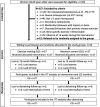Impact of 3 months of detraining after high intensity exercise on menopause-related symptoms in early postmenopausal women - results of the randomized controlled actlife project
- PMID: 36685065
- PMCID: PMC9849881
- DOI: 10.3389/fspor.2022.1039754
Impact of 3 months of detraining after high intensity exercise on menopause-related symptoms in early postmenopausal women - results of the randomized controlled actlife project
Abstract
Regular exercise might reduce postmenopausal symptoms, however even short-moderate periods of absence from exercise training might significantly reduce these positive effects. The aim of the study was thus to determine detraining effects on postmenopausal symptoms after a 3-month detraining period in early post-menopausal women. After 13 months, the exercise group (EG: n = 27; 54.6 ± 2.0; 23.6 ± 3.3 kg/m2) had to abruptly stop their supervised, facility-based, high intensity aerobic and resistance group exercise conducted three times per week due to the COVID-19 pandemic and the corresponding lockdown of all training facilities in Germany. In parallel, the control group (CG: n = 27; 55.6 ± 1.6 years, 25.2 ± 5.2 kg/m2) had to terminate their low-intensity exercise program performed once per week. Study endpoint as determined after 3 months of detraining was menopausal symptoms as determined by the Menopausal Rating Scale II (MRS II). The intention to treat principle with multiple imputation was applied. After 13 months of intense multicomponent exercise and significant exercise-induced effects on menopausal symptoms, a further 3 months of detraining resulted in non-significant deteriorations (p = .106) in the exercise group, while non-significant improvements were observed in the control group (p = .180). Corresponding group differences were significant (p = .036) after detraining. Of importance, self-reported individual outdoor activities increased by about 40% in both groups during the three-month lock-down period. Three months of absence from a supervised high-intensity group exercise protocol resulted in detraining effects on postmenopausal symptoms even when outdoor physical activity was increased significantly.
Trial registration number: ClinicalTrials.gov: NCT03959995.
Keywords: detraining effect; high-intensity exercise; menopause; postmenopausal women; quality of life.
© 2023 Jungmann, Hettchen, Kohl and Kemmler.
Conflict of interest statement
The authors declare that the research was conducted in the absence of any commercial or financial relationships that could be construed as a potential conflict of interest.
Figures


Similar articles
-
Detraining Effects on Musculoskeletal Parameters in Early Postmenopausal Osteopenic Women: 3-Month Follow-Up of the Randomized Controlled ACTLIFE Study.Calcif Tissue Int. 2021 Jul;109(1):1-11. doi: 10.1007/s00223-021-00829-0. Epub 2021 Mar 12. Calcif Tissue Int. 2021. PMID: 33712920 Free PMC article. Clinical Trial.
-
The effects of short-term moderate intensity aerobic exercise and long-term detraining on electrocardiogram indices and cardiac biomarkers in postmenopausal women.J Electrocardiol. 2020 May-Jun;60:15-22. doi: 10.1016/j.jelectrocard.2020.03.004. Epub 2020 Mar 21. J Electrocardiol. 2020. PMID: 32208176 Clinical Trial.
-
Changes in Body Composition and Cardiometabolic Health After Detraining in Older Men with Osteosarcopenia: 6-Month Follow-Up of the Randomized Controlled Franconian Osteopenia and Sarcopenia Trial (FrOST) Study.Clin Interv Aging. 2021 Apr 6;16:571-582. doi: 10.2147/CIA.S299867. eCollection 2021. Clin Interv Aging. 2021. PMID: 33854307 Free PMC article. Clinical Trial.
-
Detraining effects after 18 months of high intensity resistance training on osteosarcopenia in older men-Six-month follow-up of the randomized controlled Franconian Osteopenia and Sarcopenia Trial (FrOST).Bone. 2021 Jan;142:115772. doi: 10.1016/j.bone.2020.115772. Epub 2020 Nov 26. Bone. 2021. PMID: 33249320 Clinical Trial.
-
The effect of detraining and reduced training on the physiological adaptations to aerobic exercise training.Sports Med. 1989 Nov;8(5):302-20. doi: 10.2165/00007256-198908050-00004. Sports Med. 1989. PMID: 2692122 Review.
Cited by
-
Low BMI, blood calcium and vitamin D, kyphosis time, and outdoor activity time are independent risk factors for osteoporosis in postmenopausal women.Front Endocrinol (Lausanne). 2023 Oct 23;14:1154927. doi: 10.3389/fendo.2023.1154927. eCollection 2023. Front Endocrinol (Lausanne). 2023. PMID: 37937050 Free PMC article.
References
Associated data
LinkOut - more resources
Full Text Sources
Medical

